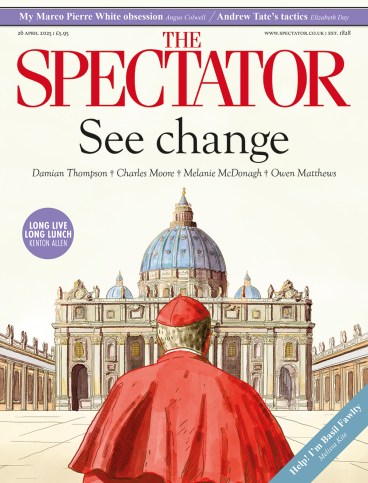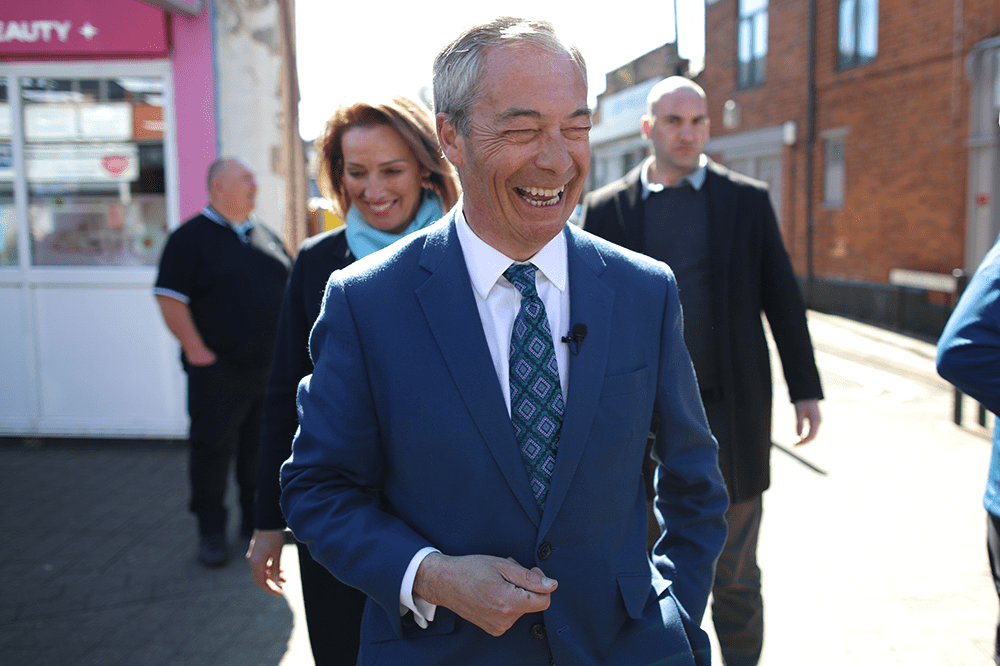
It is an irony of Brexit that, since we left the EU, British politics has become more European. The local elections on Thursday will put another nail in the coffin of the two-party system that has dominated the UK for 100 years. Labour and the Conservatives now poll a combined 45 per cent of the vote: half the country want someone different. ‘Welcome to the age of five-party politics,’ says one Tory candidate.
Alongside 1,600 council wards up for election, there are four metro mayoralties too. The reintroduction of first-past-the-post means that contests in the west of England, Cambridgeshire and Hull are four-horse races. Ten years ago, Ed Miliband’s ‘35 per cent’ strategy for victory was widely mocked; now it would guarantee a landslide.
No one has done more to usher in this era than Nigel Farage, the only man to best the two main parties in a national election since Herbert Henry Asquith’s day. Reform’s campaign for the locals has been an effective mix of old and new. Farage has barnstormed across every county up for election while his staff have fired off 3,000 Freedom of Information requests to collect a dossier of local government waste. ‘It’s really cut through with the local press,’ claims one campaigner.
Reform is drawing inspiration from Europe, too – particularly the Five Star Movement, which won Italy’s elections in 2018. Five Star’s tactics were drawn from Blue Ocean Strategy, a business textbook which argues that growth comes from finding new market spaces rather than competing in overcrowded industries. Copies have been circulated in Reform headquarters. Victories in 350 or so wards and the Runcorn by-election would make Reform the big winner of May 2025.
A shift on the right could be matched by a surge on the left. Tactical voting was key to Labour’s triumph at the general election last year. Yet just as Reform woos Red Wall voters in places such as Darlington and Durham, left-wing voters have begun to look elsewhere too. Nearly two-thirds of Labour voters lost since July have gone to parties on the left. It was Denis Healey who once jibed that his wavering supporters ‘had nowhere else to go’; increasingly, disgruntled left-wingers ‘now have places to go’, admits one Labour figure.
Throughout the New Labour years, a booming economy and increased state spending helped keep the Blair/Brown electoral coalition together. But Britain’s anaemic growth, plus the shockwaves of Trump 2.0, means largesse will not be a recourse available to ministers in the future. In real terms, most local authorities have less spending power in 2024/25 than in 2015/16. The Institute for Government thinktank predicts local spending will grow by just 1.2 per cent per year until 2030.
Reform’s campaign for the local elections has been an effective mix of old and new
The Liberal Democrats are also well-placed to benefit. Sir Ed Davey has done his best Love Actually routine in recent weeks, cosplaying as Hugh Grant standing up to the bullying US President. The Liberals have learned from their Canadian cousins and launched a patriotic ‘Buy British’ campaign. Each MP can put their own spin on it, touting their constituency’s local goods. Already, the Lib Dems have started siphoning off Keir Starmer’s votes.
The terrain of the locals mean it is the Tory shires, not Labour cities, that are threatened by the Lib Dems next week. But the constraints of office mean that the Lib Dems have free rein to spend the next three years outflanking Labour on both Donald Trump-bashing and Europhilia. As one aide puts it: ‘Rachel Reeves will do her Spring Statement and then, boom, Trump knocks it in the bin. Him being in the news cycle so often gives us an angle.’
For voters who like Euro-style leftism, the Greens could become a natural home. Labour MPs in cities such as London, Bristol and Oxford worry that their seats are being sacrificed to appease swing voters in towns. ‘Raiding aid to pay for defence went down well in my patch,’ says a Labour MP. ‘But if I were Anneliese Dodds, I’d be worried.’ Green policies such as rent controls, a wealth tax and nationalisation poll well in cities.
Green party membership has traditionally been a fruit bowl of watermelons (eco-socialists: green on the outside, red on the inside), mangoes (ex-Lib Dems: yellow on the inside) and kiwis (hardcore environmentalists: green through and through). But a recent influx of Corbynites and Labour refugees has created a new faction called Greens Organise. These radicals aim, in the words of one, to make the party a ‘vehicle for socialism – what we’d call “entryism”, in the good old days’. Having left the Labour party under Starmer, they now hope to destroy it from the outside. Activists echo Reform in their talk of ‘breaking the link’ between lifelong Labour voters and their party.
It is a relief for Labour that pro-Gaza independents – five of whom won seats at the last general election – will feature little in the locals. ‘It’s not our turf,’ explains one independent. But talks have begun on how best to run effective campaigns in the 2026 Birmingham and London elections and then in the 2029 general election. ‘We will win a dozen [parliamentary] constituencies next time,’ predicts one independent. The newly rebranded Redbridge and Ilford independents have Wes Streeting’s seat in their sights. Much will depend on dynamics in local groups: the Blackburn independents, for example, are more united than their equivalents in Kirklees.

Some within government argue that by 2029 many voters currently looking elsewhere will have returned to the Labour fold. But as Reeves’s ‘growth, growth, growth’ fails to materialise, more questions are being asked about the Chancellor’s credibility as an economic messenger to the electorate. After the Budget, winter fuel cut and bond market jitters, Ipsos puts Reeves’s public rating among voters at minus 40, making her the least popular of Britain’s politicians. The upcoming spending review is unlikely to help, with teachers, NHS staff and civil servants all threatening to walk out this summer.
Strife, strikes, no growth and an array of parties on offer. As one Tory aide puts it: ‘At least Italy has the weather.’









Comments